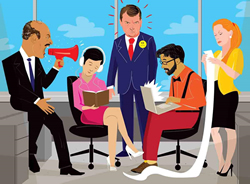Brigette Hyacinth* says bullying and adversarial employees initially seem to get things done, but eventually their attitudes produce a toxic organisational culture.
 After two employees died by suicide last year, Amnesty launched an examination of its workplace culture.
After two employees died by suicide last year, Amnesty launched an examination of its workplace culture.
The review noted that staff were mainly miserable not because of the global human rights abuses they confronted professionally, but because of the climate in which they were working.
The poor work environment was due to challenging managers, mistreatment by colleagues and bullying.
Amnesty’s work culture was being described as “adversarial” and “toxic”, with a climate characterised by a “lack of trust” and “bullying”.
Too many managers are so obsessed with getting the job done that they sacrifice good culture.
“Well, he may be a bully but he does excellent work,” is a common excuse.
Bad managers tend to let a high performer’s competency override their lack of civility and people skills.
However, such top performers are destructive to other colleagues and create a toxic culture in their organisation.
What’s much more common is systemic toxicity caused when a leader lets bad behaviour go unchecked for months or years.
A toxic work environment results from failures in leadership starting at the top of the organisation and filtering all the way down.
Nothing hurts an organisation more than when the bosses ignore or indulge a jerk employee.
You need to act quickly.
Be prepared to coach the toxic employee ‘up or out’, as soon as you spot problem behaviour.
Fast action lets the whole team know that you’re holding everyone accountable, and your focus is on creating a safe environment where everyone can perform at their best.
Signs of a Toxic Employee:
Bullying and harassing co-workers, gossiping, blaming others, insubordination, unprofessional and inappropriate communications.
Also look for rude and disrespectful behaviour, narcissistic personality disorder, negative to others and being overly competitive.
Good performance does not cancel bad behaviour.
In the long run, poor organisational culture will destroy even the best strategy.
If you don’t get rid of toxic employees, the long term ramifications can be costly.
Toxic behaviour in the workplace can cause loss of productivity, high turnover, high absenteeism, poor employee health, discrimination or harassment lawsuits and damaged reputation.
Start hiring only people whose values and purpose fit with your culture.
Research shows that people with strong emotional intelligence (EQ) are more likely to succeed than those with high IQs or relevant experience.
Teamwork should be valued more than individual contributions.
Every employee matters and should be made to feel this way.
In 2018, both Cristiano Ronaldo and Lionel Messi, who are regarded as two of the greatest football players, were out of the World Cup after their national teams were eliminated.
France won the World Cup by mastering the concept of teamwork.
When it comes to winning championships, it’s not always the team with the most superstars that wins; it’s the one that works best together as a team.
* Brigette Hyacinth founded the MBA Caribbean Organisation that conducts seminars and workshops in leadership, management and education as well as providing motivational speeches. She can be contacted at www.mbacaribbean.org.
This article first appeared on Brigette’s website.








